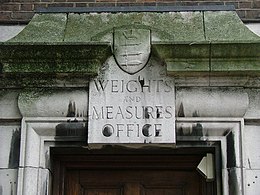
The imperial system of units, imperial system or imperial units (also known as British Imperial[1] or Exchequer Standards of 1826) is the system of units first defined in the British Weights and Measures Act 1824 and continued to be developed through a series of Weights and Measures Acts and amendments.
The imperial system developed from earlier English units as did the related but differing system of customary units of the United States. The imperial units replaced the Winchester Standards, which were in effect from 1588 to 1825.[2] The system came into official use across the British Empire in 1826.
By the late 20th century, most nations of the former empire had officially adopted the metric system as their main system of measurement, but imperial units are still used alongside metric units in the United Kingdom and in some other parts of the former empire, notably Canada.
The modern UK legislation defining the imperial system of units is given in the Weights and Measures Act 1985 (as amended).[3]
- ^ Britannica Educational Publishing (2010). The Britannica Guide to Numbers and Measurement. The Rosen Publishing Group. p. 241. ISBN 978-1-61530-218-5. Archived from the original on 14 January 2023. Retrieved 1 July 2015.
- ^ Chaney, Henry James (1897). A Practical Treatise on the Standard Weights and Measures in Use in the British Empire with some account of the metric system. Eyre and Spottiswoode. p. 3. Retrieved 11 September 2016.
- ^ "Weights and Measures Act 1985". legislation.gov.uk. Archived from the original on 2 January 2022. Retrieved 20 January 2020.